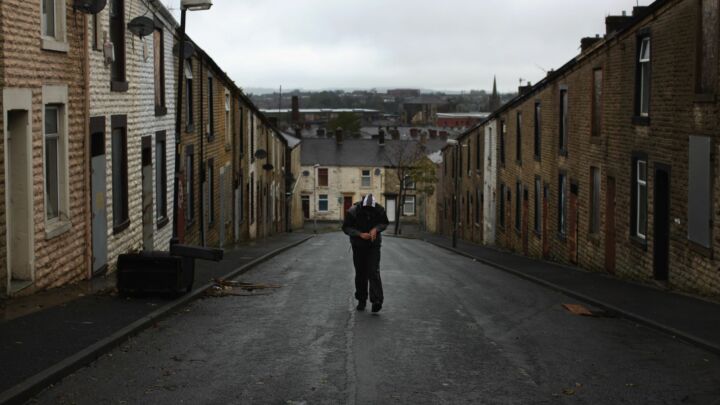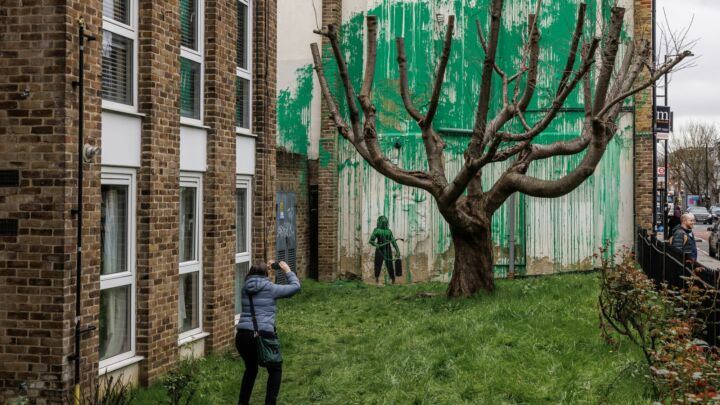The rampant Israelophobia of Germany’s elites
The Berlinale film festival was dominated by an unhinged hatred of the Jewish state.

The Berlin International Film Festival, known colloquially as the ‘Berlinale’, turned into a carnival of Israel-bashing last month.
The closing gala was a particular low point. Numerous artists took to the stage with ‘Ceasefire now!’ written on scraps of paper attached to their evening wear. US filmmaker Ben Russell received an award sporting a keffiyeh. He then used his acceptance speech to accuse Israel of committing ‘genocide’. Israeli filmmaker Yuval Abraham and Palestinian activist Basel Adra, who together co-directed the winner of the best documentary award, made their speeches all about Israel, too. Abraham called for an end to ‘apartheid’ in Israel, while Adra said he found it hard to accept the award while tens of thousands were being ‘massacred’ by Israel.
More worrying was the audience reaction. Every anti-Israel gesture was cheered to the rafters, including by the politicians in attendance. The federal culture minister, Claudia Roth (Green Party), and the Berlin mayor, Kai Wegner (Christian Democratic Union), were pictured eagerly clapping along to every attack on the Jewish State.
This display of Israel-bashing has since been heavily criticised in the media. After all, this wasn’t supposed to be a political rally, it was a high-profile film festival funded by the taxpayer. Many have asked how the organisers allowed this to happen. The scandal is all too reminiscent of the furore that surrounded the similarly state-funded Documenta Fifteen exhibition in 2022. Numerous artworks selected for the show contained vicious anti-Semitic tropes. The organisers claimed they didn’t even notice the anti-Semitism of the artworks until a public backlash ensued.
Commentators have been particularly taken aback by the shameful one-sidedness of the Berlinale. There was plenty of sympathy on show for the Palestinian victims of the war, but no mention of the Israeli victims of Hamas’s atrocities on 7 October. This was all the more striking given that Israeli actor David Cunio, whose film Youth was shown at the festival 10 years ago, was abducted on 7 October along with his two children. Cunio remains a hostage, yet no one at the ceremony even mentioned his name.
Berlin mayor Wegner has since tried to distance himself from the Berlinale. Roth, meanwhile, has claimed that she only clapped because she wants peaceful coexistence in the region. Her justification has convinced few and she now faces calls to resign.
Needless to say, Roth’s potential resignation wouldn’t be enough to fix the Israelophobia of Germany’s political and cultural elites. Time and again, leading figures in politics and the arts have failed to stand up against the growing anti-Semitic hatred of the Jewish State. For instance, at a joint press conference in 2022, chancellor Olaf Scholz remained silent after Palestinian president Mahmoud Abbas accused Israel of committing ‘50 Holocausts’ against the Palestinians. Last year, Scholz responded meekly to President Erdoğan of Turkey’s claim that Germany feels too guilty about the Holocaust to stand up to Israel.
There are perhaps two main reasons why Germany’s elites find themselves in this position. Many seem almost fearful of antagonising the ‘pro-Palestine’ lobby. Many others, like Roth, openly sympathise with the woke identity politics that is now fuelling today’s Israelophobic anti-Semtism.
For their part, the organisers of Berlinale have attempted to rebut the media criticism. They claim that the festival provides ‘a platform for open dialogue across cultures and countries’ and that it is necessary, therefore, to ‘tolerate opinions and statements that contradict our own opinions’.
But this is disingenuous. The Berlinale’s attitude to tolerance and freedom of expression is highly selective at best. In early February, organisers announced that five members of the right-wing populist AfD party had been disinvited, after protests from artists and filmmakers. That’s hardly a sign of the Berlinale’s willingness to ‘tolerate opinions that contradict our own opinions’. Moreover, in the past few days, it has emerged that Berlinale organisers actually turned down requests to host a panel debate about anti-Semitism, despite there being numerous panel debates about countless other issues.
Some commentators are now questioning whether the Berlinale has a future. This is premature. The Berlinale shows many excellent films that are surely worth seeing. And there’s a huge public demand for the show to go on, too. The festival reported its best ticket sales this year since the pandemic.
However, the woke takeover of the Berlinale, its tendency to engage less in art and more in politics, is undermining its integrity. When it began in 1951, the festival was a glamorous movie-centric affair, attended by stars like Sophia Loren and Gary Cooper, and the award winners were determined by public votes.
If the Berlinale is to right its course, it needs to refocus on filmmaking and on the interests of the general public. Perhaps then it will be able to free itself from the poisonous grip of Israelophobia.
Sabine Beppler-Spahl is spiked’s Germany correspondent.
Picture by: Getty.
To enquire about republishing spiked’s content, a right to reply or to request a correction, please contact the managing editor, Viv Regan.






Comments
Want to join the conversation?
Only spiked supporters and patrons, who donate regularly to us, can comment on our articles.